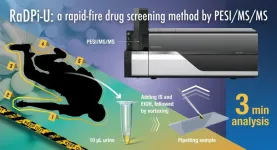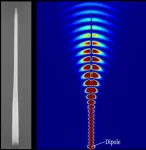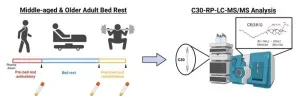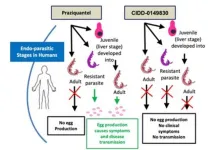(Press-News.org)
Drugs, both legal and illegal, cause millions of cases of severe intoxication every year, leading to health complications and even fatalities. Often, they are also implicated in violent and sexual harassment crimes, as well as accidents. Obtaining detailed information about the drugs consumed by a criminal or victim is often challenging. Forensic professionals rely on drug screening techniques performed on biological samples, such as blood or saliva, to gather crucial evidence.
Today, various types of practical drug screening methods exist, each with their own unique advantages and drawbacks. For example, immunological drug screening tests can provide results quickly, but are limited to very specific drugs and often show false positives. In contrast, techniques based on mass spectrometry (MS), which analyze the mass-to-charge ratio of captured ions, tend to be more accurate. However, conventional MS approaches require careful sample preparation steps, which makes them somewhat tedious and difficult to use for non-experts.
Against this background, a research team from Japan has developed a promising drug screening technique dubbed “RaDPi-U” that can rapidly detect the presence of 40 forensically relevant drugs from urine samples. Their study, detailing the performance of their approach in preliminary tests, was published in the journal Analytical and Bioanalytical Chemistry on March 25, 2024. Members of this research team included Professor Kei Zaitsu from Kindai University, Dr. Kazuaki Hisatsune of the Forensic Science Laboratory at Aichi Prefectural Police Headquarters, Dr. Akira Iguchi of the Research Laboratory on Environmentally-conscious Developments and Technologies (E-code), National Institute of Advanced Industrial Science and Technology (AIST), Dr. Masaru Taniguchi of Nagoya City Public Health Research Institute, and Dr. Tomomi Asano of Kinjo Gakuin University.
The proposed technique is based on a combination of probe electrospray ionization and tandem mass spectrometry (PESI-MS/MS). Simply put, PESI involves capturing molecules to be analyzed using a thin metal probe, which induces a strong electric field that ionizes compounds adsorbed onto the surface of the probe. These captured molecules, or “analytes,” are transferred to a series of mass spectrometers, which determine the mass-to-charge ratio and additional structural information to determine the concentration of specific compounds (drugs).
The procedure for RaDPi-U is extremely simple, requiring only a few steps. First, 10 microliters of urine are collected from the screened individual and mixed with a substance predetermined as an internal standard, and ethanol. Then, after thoroughly mixing the sample using a vortex mixer (pre-treatment: 1.5 minutes), the same is pipetted and laid onto a sample plate for PESI. Finally, the plate is set into the PESI-MS/MS (analysis time: 1.5 minutes), which produces results in less than three minutes and automatically reports them using a built-in software.
The researchers carefully investigated the reliability and accuracy of the results for multiple concentrations of each of the 40 screened drugs. Compared to established methods, the proposed technique exhibited an equal or better lower limit of detection for all drugs, meaning that it can detect drug concentrations as minuscule as fractions of a nanogram per microliter for several compounds. Moreover, the measurements were highly repeatable, demonstrating the reliability of RaDPi-U. This was further proved through tests with postmortem urine samples. To top things off, this method requires only one single substance as an internal standard rather than a specific compound for each screened drug, which means setting up the device is straightforward.
Overall, the team has high hopes that RaDPi-U will prove to be a powerful tool for forensic departments everywhere. “Our method boasts simplicity and user-friendliness, enabling even non-professionals to conduct drug analysis with ease,” remarks Prof. Zaitsu. “In essence, our research streamlines drug analysis to unprecedented levels, thereby fostering long-term efforts to curb drug-related crimes.” He also notes that RaDPi-U has potential not only in forensic fields but also in tasks related to clinical toxicology.
Additional efforts are already underway to make the proposed method even more useful. “While this study is preliminary and the number of currently detectable drugs is limited to 40, we are actively expanding the range of targeted substances, aiming to enhance both the speed and scope of detection,” comments Dr. Hisatsune. The researchers are also developing a similar method for blood samples, called RaDPi-B, which will be essential when urine samples are unavailable or in case of drugs for which urine-based testing is not applicable.
Let us hope these promising techniques will serve as a stepping stone toward a world free from the scourge of drug abuse.
END
Hundreds of studies are published each year on attention deficit hyperactivity disorder (ADHD), but more work is needed to ensure those findings improve lives.
With input from expert stakeholders across the field, researchers at the Southern California Evidence Review Center, part of the Keck School of Medicine of USC, have synthesized the latest insights so that they can ultimately inform clinical practice. Broadly, they found that both medications and psychosocial treatments work for treating ADHD and that children with the condition can and do get better.
“We have more research than ever on ADHD, but we need ...
Researchers at the University of Waterloo's Institute for Quantum Computing (IQC) have brought together two Nobel prize-winning research concepts to advance the field of quantum communication.
Scientists can now efficiently produce nearly perfect entangled photon pairs from quantum dot sources.
Entangled photons are particles of light that remain connected, even across large distances, and the 2022 Nobel Prize in Physics recognized experiments on this topic. Combining entanglement with quantum dots, a technology recognized with the Nobel Prize in Chemistry in 2023, the IQC research team aimed to optimize the ...
By exploring attitudes in the USA, UK, Italy, South Africa, Mexico, and Poland – countries with different economies, cultures and political regimes (past and present) – the paper shows that, in all countries, right- compared to left-wing supporters evaluated the past more positively.
The data reveal that, in part, this occurs because right-wing supporters are more nostalgic about tradition. While the right looked more favourably to the past, in the USA and Poland (and potentially in the UK too), the left was more ...
Scientists have successfully carried out pioneering fecal microbiota transplantations on Navy bottlenose dolphins that showed signs of gastrointestinal disease.
One dolphin in particular who was outwardly ill was able to be taken off medication during the treatment course, with his appetite and energy returning to normal, according to the team at the National Marine Mammal Foundation.
The project was carried out jointly between the NMMF, the U.S. Navy Marine Mammal Program and the Gilbert Lab at UCSD School of Medicine and Scripps Institution of Oceanography, and its findings were published in the Journal of ...
Scientists report they have extracted a compound with powerful antibacterial properties from the skin of farmed African catfish. Although additional testing is necessary to prove the compound is safe and effective for use as future antibiotic, the researchers say it could one day represent a potent new tool against antimicrobial-resistant bacteria such as extended-spectrum beta-lactamase (ESBL) producing E. coli.
Hedmon Okella is a postdoctoral researcher at the University of California, Davis, and led the project.
“The global public health threat due to antimicrobial resistance ...
A new study examining cholesteryl esters suggests that periods of prolonged inactivity may affect people differently depending on their age. Cholesteryl esters — which consist of cholesterol molecules bonded with fatty acids — store and transport cholesterol throughout the body.
As people get older, their risk of being hospitalized or bedridden increases. These long periods of inactivity come with a host of negative health effects such as reduced insulin function and loss of lean muscle, bone mass and strength. Scientists are working to better understand the biology involved in these changes so that ...
A newly developed compound is showing promise in animal studies as a more effective treatment for human schistosomiasis, an understudied tropical disease caused by parasitic worms. The spread of schistosomiasis, a disease responsible for nearly 12,000 deaths globally each year, has been documented in 78 nations.
Although schistosomiasis transmission tends to occur in tropical and subtropical areas, climate change could shift it into new areas such as southern Europe. There is currently no vaccine available for the disease, which comes with severe clinical symptoms. The drug praziquantel is used for treatment. However, resistant mutations ...
New research conducted in mice offers insights into what’s going on at the molecular level that could cause people with diabetes to develop Alzheimer’s disease.
The study adds to a growing body of research on the links between Type 2 diabetes and Alzheimer’s disease, which some scientists have called “Type 3 diabetes.” The findings suggest that it should be possible to reduce the risk of Alzheimer’s by keeping diabetes well controlled or avoiding it in the first place, according to researchers.
Narendra Kumar, an associate professor at Texas A&M University in College ...
A new way to classify tuberculosis (TB) that aims to improve focus on the early stages of the disease has been presented by an international team involving researchers at UCL.
The new framework, published in The Lancet Respiratory Medicine, seeks to replace the approach of the last half century of defining TB as either active (i.e., causing illness and potentially infectious to others) or latent (being infected with the bacterium that causes TB [M tuberculosis] but feeling well and not infectious to others) – an approach researchers say is limiting progress in eradicating the disease.
Of ...
**Note: the release below is a special early release from the European Congress of Clinical Microbiology and Infectious Diseases (ECCMID 2024, Barcelona, Spain, 27-30 April). Please credit the congress if you use this story**
A study of two large European patient cohorts has found that for every 10% increase in butyrate-producing bacteria in a patient’s gut, the risk of hospitalisation for any infection falls by between 14 and 25% across two large national cohorts. The study will be presented at this year’s European Congress of Clinical Microbiology and Infectious Diseases (ECCMID 2024) in Barcelona, Spain (27-30 April) and is by ...




